Related Research Articles

Money laundering is the process of illegally concealing the origin of money obtained from illicit activities such as drug trafficking, underground sex work, terrorism, corruption, embezzlement, and gambling, and converting the funds into a seemingly legitimate source, usually through a front organization.

Organized crime is a category of transnational, national, or local group of centralized enterprises run to engage in illegal activity, most commonly for profit. While organized crime is generally thought of as a form of illegal business, some criminal organizations, such as terrorist groups, rebel forces, and separatists, are politically motivated. Many criminal organizations rely on fear or terror to achieve their goals or aims as well as to maintain control within the organization and may adopt tactics commonly used by authoritarian regimes to maintain power. Some forms of organized crime simply exist to cater towards demand of illegal goods in a state or to facilitate trade of goods and services that may have been banned by a state. Sometimes, criminal organizations force people to do business with them, such as when a gang extorts protection money from shopkeepers. Street gangs may often be deemed organized crime groups or, under stricter definitions of organized crime, may become disciplined enough to be considered organized. A criminal organization can also be referred to as an outfit, a gang, crime family, mafia, mob, (crime) ring, or syndicate; the network, subculture, and community of criminals involved in organized crime may be referred to as the underworld or gangland. Sociologists sometimes specifically distinguish a "mafia" as a type of organized crime group that specializes in the supply of extra-legal protection and quasi-law enforcement. Academic studies of the original "Mafia", the Italian Mafia, as well as its American counterpart, generated an economic study of organized crime groups and exerted great influence on studies of the Russian mafia, the Chinese triads, the Hong Kong triads, and the Japanese yakuza.

Kleptocracy, also referred to as thievocracy, is a government whose corrupt leaders (kleptocrats) use political power to expropriate the wealth of the people and land they govern, typically by embezzling or misappropriating government funds at the expense of the wider population. One feature of political-based socioeconomic thievery is that there is often no public announcement explaining or apologizing for misappropriations, nor any legal charges or punishment levied against the offenders.

The illegal drug trade, drug trafficking, or narcotrafficking is a global black market dedicated to the cultivation, manufacture, distribution and sale of prohibited drugs. Most jurisdictions prohibit trade, except under license, of many types of drugs through the use of drug prohibition laws. The think tank Global Financial Integrity's Transnational Crime and the Developing World report estimates the size of the global illicit drug market between US$426 and US$652 billion in 2014 alone. With a world GDP of US$78 trillion in the same year, the illegal drug trade may be estimated as nearly 1% of total global trade. Consumption of illegal drugs is widespread globally, and it remains very difficult for local authorities to reduce the rates of drug consumption.
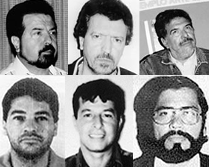
The Cali Cartel was a drug cartel based in southern Colombia, around the city of Cali and the Valle del Cauca. Its founders were the brothers Gilberto Rodríguez Orejuela, Miguel Rodríguez Orejuela and José Santacruz Londoño. They broke away from Pablo Escobar and his Medellín associates in 1988, when Hélmer "Pacho" Herrera joined what became a four-man executive board that ran the cartel.
Operation Greenback was a Miami, Florida-based, multi-agency U.S. government task force targeting money laundering connected to drug trafficking.
The Israeli mafia are the organized crime groups operating in Israel or consisting of Israeli members. There are 16 crime families operating in Israel, five major groups active on the national level and 11 smaller organizations. There are six Jewish crime families active and three Arab crime families. Many heads and members of the crime groups have either been killed or are in prison.
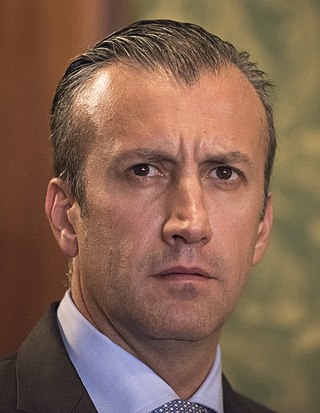
Tareck Zaidan El Aissami Maddah is a Venezuelan politician, who served as the vice president of Venezuela from 2017 to 2018. He served as Minister of Industries and National Production since 14 June 2018, and as Minister of Petroleum from 27 April 2020 until 20 March 2023. He previously was Minister of the Interior and Justice from 2008 to 2012, Governor of Aragua from 2012 to 2017, and the vice president of Venezuela from 2017 to 2018. While holding that office, El Aissami faced allegations of participating in corruption, money laundering and drug trafficking. In 2019, U.S. Immigration and Customs Enforcement (ICE) added El Aissami to the ICE Most Wanted List, listed by the Homeland Security Investigations unit. El Aissami, who was among the power brokers in Nicolás Maduro's government, resigned on 20 March 2023 during a corruption probe. He was arrested by the Venezuelan prosecutor's office on charges of treason, money laundering and criminal association.
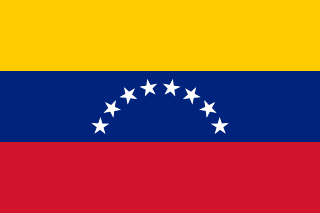
The level of corruption in Venezuela is very high by world standards and is prevalent throughout many levels of Venezuelan society. Discovery of oil in Venezuela in the early 20th century worsened political corruption. The large amount of corruption and mismanagement in the country has resulted in severe economic difficulties, part of the crisis in Venezuela. A 2014 Gallup poll found that 75% of Venezuelans believed that corruption was widespread throughout the Venezuelan government. Discontent with corruption was cited by demonstrators as one of the reasons for the 2014 and 2017 Venezuelan protests.
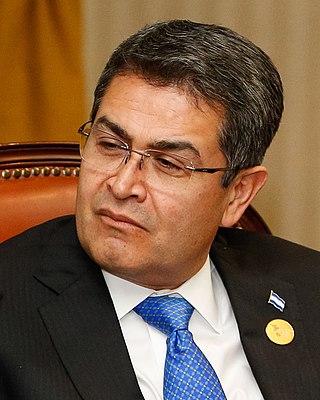
Juan Orlando Hernández Alvarado, also known by his initials JOH, is a Honduran lawyer, politician and convicted drug trafficker who was president of Honduras from 2014 to 2022 for two consecutive terms.
Illegal drug trade in Venezuela is the practice of illegal drug trading in Venezuela. Venezuela has been a path to the United States for cocaine originating in Colombia, through Central America and Mexico and Caribbean countries such as Haiti, the Dominican Republic, and Puerto Rico. In the 2010s, Venezuela also gradually became a major producer of cocaine.
The Cartel of the Suns is a Venezuelan organization supposedly headed by high-ranking members of the Armed Forces of Venezuela who are involved in international drug trade. According to Héctor Landaeta, journalist and author of Chavismo, Narco-trafficking and the Military, the phenomenon began when Colombian drugs began to enter into Venezuela from corrupt border units and the "rot moved its way up the ranks."

The Narcosobrinos affair is the situation of events that surrounded two nephews of Venezuelan President Nicolás Maduro and his wife Cilia Flores who were arrested for narcotics trafficking. The nephews, Efraín Antonio Campo Flores and Francisco Flores de Freitas, were arrested on 10 November 2015 by the United States Drug Enforcement Administration in Port-au-Prince, Haiti after attempting to transport 800 kilograms of cocaine into the United States. A year later on 18 November 2016, the two nephews were found guilty, with the cash allegedly destined to "help their family stay in power". On 14 December 2017, the two were sentenced to 18 years of imprisonment.
The Miami drug war was a series of armed conflicts in the 1970s and 1980s, centered in the city of Miami, Florida, between the United States government and multiple drug cartels, primarily the Medellín Cartel. It was predominantly fueled by the illegal trafficking of cocaine.
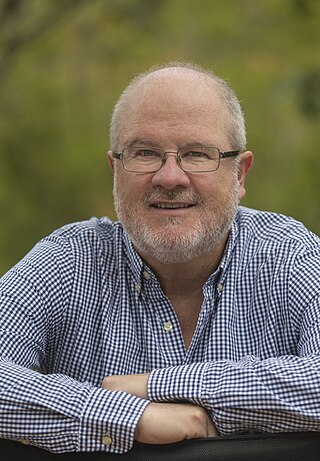
Gerardo Reyes Copello is an investigative journalist. He works as director of the investigative unit of Univision Network. He worked at El Nuevo Herald in Miami, Florida. In The Miami Herald, he won a shared Pulitzer prize in 1999.
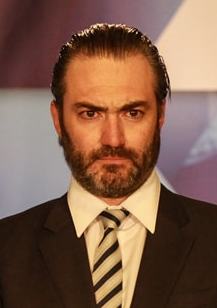
Acisclo Valladares Urruela is a Guatemalan attorney and notary who served as Economics Minister during the administration of President Jimmy Morales. Previously he held the post of Special Mission Appointed Ambassador to attend to the international agenda related to the Alliance for the Prosperity of the North Triangle Plan and General Coordinator of the executive committee of the National Competitiveness Program, PRONACOM.
The Local Committees for Supply and Production are food distribution committees promoted by the Venezuelan government in which the communities themselves supply and distribute the priority foods through a house-to-house delivery method. It was established in 2016 by President Nicolás Maduro in response to the shortages in Venezuela. The committees have been subject of complaints about corruption, political use, delays, poor food quality and price increases without prior warning. This service is a subsidiary of the Ministry of Popular Power for Food.

During the crisis in Venezuela, governments of the United States, the European Union (E.U.), Canada, Mexico, Panama and Switzerland have applied sanctions against Venezuela, as well as against specific government entities and individuals associated with the administration of Nicolás Maduro. Through April 2019, the U.S. sanctioned more than 150 companies, vessels and individuals, in addition to revoking visas of 718 individuals associated with Maduro. By September 2019, the Center for Strategic and International Studies said 119 Venezuelans had been sanctioned by the U.S. and several other countries.

Alex Nain Saab Morán is a Colombian businessman. Saab was the subject of journalistic investigations for conducting businesses estimated at US$135 million with the Venezuelan government, while other Colombian businessmen had stopped exporting to Venezuela due to uncertainty regarding payments and tight exchange controls. Saab's name has appeared in multiple ICIJ leaks including the Panama Papers, Pandora Papers and the FinCEN Files.
Salvador "Sal" Magluta is a Cuban American former drug kingpin and powerboat racer who, along with his partner Willy Falcon, operated one of the most significant cocaine trafficking organizations in South Florida history. The duo became known as Los Muchachos, Spanish for "The Boys".
References
- 1 2 3 4 Van Voris, Bob (18 November 2019). "Professor Who Wrote Book on Drug Crime Is Accused of Money Laundering". Bloomberg LP. Retrieved 19 November 2019.
- 1 2 3 4 "Professor who is expert on corruption charged with laundering money". The Guardian. 19 November 2019. Retrieved 19 November 2019.
- 1 2 3 4 5 "Dr Bruce Bagley". Swansea University. Retrieved 20 November 2019.
- ↑ "Bruce Michael Bagley". University of Miami. Retrieved 20 November 2019.
- 1 2 "UM professor pleads guilty to laundering $2 million from Venezuelan corruption money". Miami Herald. Retrieved 15 July 2021.
- ↑ Patel, Vimal (2021-11-17). "Professor Cited as Corruption Expert Is Sentenced for Money Laundering". The New York Times. ISSN 0362-4331 . Retrieved 2021-11-21.
- ↑ Bagley, B. M., & Rosen, J. D. (2015). Drug Trafficking, Organized Crime, and Violence in the Americas Today (1st ed.). University Press of Florida.
- ↑ "Bruce Bagley | Fulbright Scholar Program". fulbrightscholars.org. Retrieved 2024-05-07.
- ↑ "The Faculty of SIS". Archived from the original on 2001-11-26.
- ↑ "Forum Spotlights Relevant Issues".
- ↑ "Court filings: Maduro ally met with US prior to arrest". AP NEWS. 2021-11-10. Retrieved 2021-11-11.
- ↑ Cohen, Luc; Ulmer, Alexandra (2021-11-11). "Maduro ally Saab met with U.S. law enforcement years ago, court records show". Reuters. Retrieved 2021-11-11.